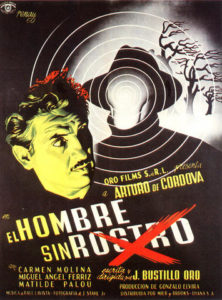 This 1950 Mexican horror fest is notable for its similarities to PSYCHO, which it preceded by a decade. EL HOMBRE SIN ROSTRO (THE FACELESS MAN) was also an evident influence on Alejandro Jodorowsky’s SANTA SANGRE in its combination of psychology, surrealism and ahead-of-its-time nastiness.
This 1950 Mexican horror fest is notable for its similarities to PSYCHO, which it preceded by a decade. EL HOMBRE SIN ROSTRO (THE FACELESS MAN) was also an evident influence on Alejandro Jodorowsky’s SANTA SANGRE in its combination of psychology, surrealism and ahead-of-its-time nastiness.
Steeped in Freudian psychology, it begins with an extended dream sequence in which Juan Carlos Lozano, a cop, finds himself in a surreal landscape in which several women have been murdered. Juan Carlos is faced with the killer, a black-coat wearing individual who Juan Carlos is ordered to shoot by a strange woman. This he does, but the bullets have no effect on the figure, who turns out not to have a face. Worse, the woman laughs at Juan Carlos for his failure to carry through with the killing.
Cut to one Dr. Britel, who writes a confession in which he claims to be a murderer. Much of the remainder of the film consists of an extended dramatization of that confession, beginning with the discovery of a murdered prostitute. It’s apparently the latest in a long line of misogynistic killings, and the police are baffled.
Back to Juan Carlos Lozano, who is suffused with guilt over not being able to find the killer, thus compounding the feelings of apprehension and inadequacy that are already evident. He agrees to be psychoanalyzed by his doctor, the aforementioned Eugenio Britel, which brings up the source of Juan Carlos’s anxiety: the faceless man haunting his dreams. Juan Carlos relates the dream outlined above, and another one involving several odd, spindly ghosts hanging in space and a chained-up monster—who is apparently another facet of the faceless man.
Juan Carlos goes on to discuss his love life with Eugenio. It seems the only woman Juan Carlos has ever truly loved was his ultra-possessive mother, and that several years earlier he wanted to get married. His mother refused to give her consent, however, and Juan Carlos insulted her, thus inducing a heart attack in the old woman.
This causes Juan Carlos to become filled with resentment toward his intended fiancee. His mother recovers and he calls off the engagement, but the resentment remains. Upon spotting his maid making out with her boyfriend Juan Carlos snaps, and kills her outside his house.
Juan Carlos recalls a final dream to Eugenio in which he’s led through a hazy landscape by his mother, who beckons him to the Lake of Dark Waters. There his hands sink into the water, which turns out to be human blood. Reflected in the blood is the faceless man, whose face is visible at last—and it’s his mother’s!
This is a good film: atmospheric, involving and often arrestingly bizarre. Unfortunately it’s also dramatically inconsistent, with the flashback-laden structure, framed by Dr. Britel recounting his crimes, being confusing and, frankly, wrong, as much of the following is depicted through other peoples’ viewpoints.
The histrionic performances and overwrought sentimentality that suffuse the proceedings may seem off-putting, but both were staples of Mexican cinema at the time. Another Mexican cinema mainstay that’s touched upon is the “Rumberas” genre that was popular in the mid-twentieth century, consisting of dance-heavy woman-centered melodramas that EL HOMBRE SIN ROSTRO recalls in its prominent dancehall-set sequences, highly noirish photography and depiction of the fairer sex, which seems a perverse rejoinder to the liberated females of the Rumberas films.
Also worth noting are the highly surreal dream sequences, which recall the famous Salvador Dali designed scenes from Alfred Hitchcock’s SPELLBOUND. That 1945 film was centered on abnormal psychology, and was a likely influence on EL HOMBRE SIN ROSTRO. Hitchcock would appear to have returned that particular favor in 1960, thus bringing things full circle, and leaving us with a film that PSYCHO fans should really track down.
Vital Statistics
EL HOMBRE SIN ROSTRO (THE FACELESS MAN)
Oro Films
Director: Juan Bustillo Oro
Producer: Juan Bustillo Oro, Gonzalo Elvira
Screenplay: Juan Bustillo Oro
Cinematography: Jorge Stahl, Jr.
Editing: Jorge Bustos
Cast: Arturo de Cordova, Carmen Molina, Miguel Angel Ferriz, Queta Lavat, Chela Campos, Fernando Galiana, Armando Saenz, Ramon Sanchez, Kika Meyer, Wolf Ruvinskis, Julio Daneri, Josefina Burgos, Matilde Palou
